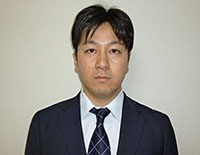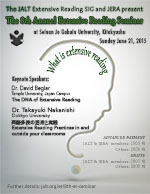8th Annual Extensive Reading Seminar 2015
The 8th Annual Extensive Reading Seminar has now concluded. We at the ER SIG would like to express our great appreciation to those 60 who attended, including our 11 sponsors, AM representatives and the very warm and welcoming staff and student volunteers at Seinan Jo Gakuin University who did a stellar job preparing for, executing and wrapping up a highly successful seminar. Thank you everyone and we hope to see many of you again next year!
Theme: "What is Extensive Reading?" Hosted by: Seinan Jo Gakuin University, Kitakyushu
Sponsored by:
| Oxford University Press | Pearson Japan |
| National Geographic/Cengage | Macmillan |
| Abax | Lexxica |
| Xreading | englishbooks.jp |
| Nellie's English Books |
For a full list of Presenters and Sponsored Speakers, please go here.
Please read "A Note about the ER Seminar Theme" below to gain some context for addressing the theme.
Date: Sunday, June 21, 2015
The Extensive Reading Seminar is an annual gathering of language instructors focusing on research and practice related to Extensive Reading. Please check below for more details. You can also see general information about the 2015 venue here in Japanese. (Seinan Jo Gakuin University) and ER Seminar information in English at the following links for the venue, facilities, and accommodation. At the link following is a draft of the ER Seminar Block Schedule.
Keynote speakers:
David Beglar

Temple University, Japan Campus
Title: The DNA of Extensive Reading
Abstract: A central question in the field of extensive reading concerns the cognitive processing that learners engage in when reading extensively. The main proposal put forward in this presentation is that theories of fluency development suggest that certain types of extensive reading offer a nearly ideal way for second language learners to develop reading fluency; hence, reading fluency development is part of the "DNA" of extensive reading. In this presentation, I first outline the dominant theories of automatization and fluency development. I then discuss the implications of those theories for various ways to implement extensive reading, and finally, I cover some of the empirical extensive reading literature that speaks both to the theories of fluency development and the implications of those theories.
Takayuki Nakanishi

Dokkyo University
Title: 英語多読の活用と実践 Extensive Reading Practices in and outside your classrooms
Abstract: 「多読とは何か」との問いに対し、多読研究について概観し、その活用と実践に関して実用的な面に焦点をあてます。日本国内のみならず、英語多読に関する研究発表は多くの学会で散見され(Nation, 2015)、その結果、多くの論文が出版され、研究結果を統合させることが出来るまでとなっています (Nakanishi, 2014)。この講演では多読研究の統合結果にもふれ、どのような研究が行われているか考察し、そして、どのような研究が必要とされているのか、考えていきたいと思います。
Registration
Seminar registration will open in early April. Presenters must register by April 30th, 11:59 p.m. JST. Regular preregistration will close May 31st.
Preregistration with advance payment:
1000 yen for members of JALT ER SIG or JERA
2000 yen for non-members
Onsite payment:
2000 yen for members of JALT ER SIG or JERA
3000 yen for non-members
Preregistration for the 2015 Extensive Reading Seminar can be done via your account here. If you do not yet have an account, please create one and then register for the seminar. Preregistration and bank transfer deadlines are April 29th for presenters and May 31st for others. Bank transfers must be made to the following account:
Account Bank: Shinsei
Branch Number: 400
Branch Name: Honten
Account Holder: KENICHIRO KOBAYASHI
Katakana: ケンイチロウ コバヤシ
Account Number: 2237144
Type of Account: Regular (Futsuu)
Note: The katakana is not needed by Shinsei, but some banks require you to input katakana when you make a transfer.
8th ER Seminar Special Call
第8回多読学会は発表参加を募集しています。特に小学校・中学校で多読を実践している経験についての発表、そして、多読に関する日本語での発表をお考えの方はふるってご応募下さい。福岡近隣に在住の先生方及び、全国からの日本語での発表予定の先生方に、特別にご案内しております。参加ご希望の方は100語までの英文か、250字までの和文で発表要旨を2015年4月10日までにご提出下さい。応募はこちらからどうぞ。
The Extensive Reading Seminar would like to encourage local-area instructors to share their ER experiences at the 2015 ER Seminar. We would especially like to encourage anyone with experience with ER in primary or secondary school settings and/or who will present in Japanese to speak. Therefore, we are opening a special submissions period for instructors from Fukuoka or adjacent prefectures as well as those submitting in Japanese. Please submit your 100-word English abstract or your 250-character Japanese abstract by April 10 here.
Note about the ER Seminar Theme
At the Extensive Reading Colloquium at JALT2014, Rob Waring and Stuart McLean, in a preview of an upcoming article, proposed a rethinking of how we define ER. They suggest a shift from a general acceptance of Day and Bamford’s ten principles as defining ER to a view that defines a few core elements of what constitutes ER and recognizes other variable elements that can be present in ER programs.
They propose four core elements, which they have summarized as follows:
- Fluent, sustained comprehension of text as meaning-focused input
- Large volume of material
- Reading over extended periods of time
- Texts are longer, requiring comprehension at the discourse level.
Other elements, such as where reading is done, whether it is required or not, pleasurable or not, if and how it is monitored and/or assessed, and so on are considered variables. These largely pedagogical elements can be altered to suit various teaching and learning contexts and provide areas for focus of ER research, as long as the core elements are present.
They also propose to promote dialogue about defining the core elements of ER more precisely. To this end they present some possible areas for discussion that may arise, including what constitutes a high enough volume to be ER, does the presence of elements such as assessment or requirement mean it is not ER, or elements such as being for pleasure or using graded readers mean it is ER.
The officers of the ER SIG have decided to support and encourage this discussion by focusing our events this year on the question, “What is Extensive Reading?” If you feel you have a contribution to make to this discussion, if you have a related research project to report on, etc., we would like to hear from you.
Thomas E. Bieri
Coordinator



